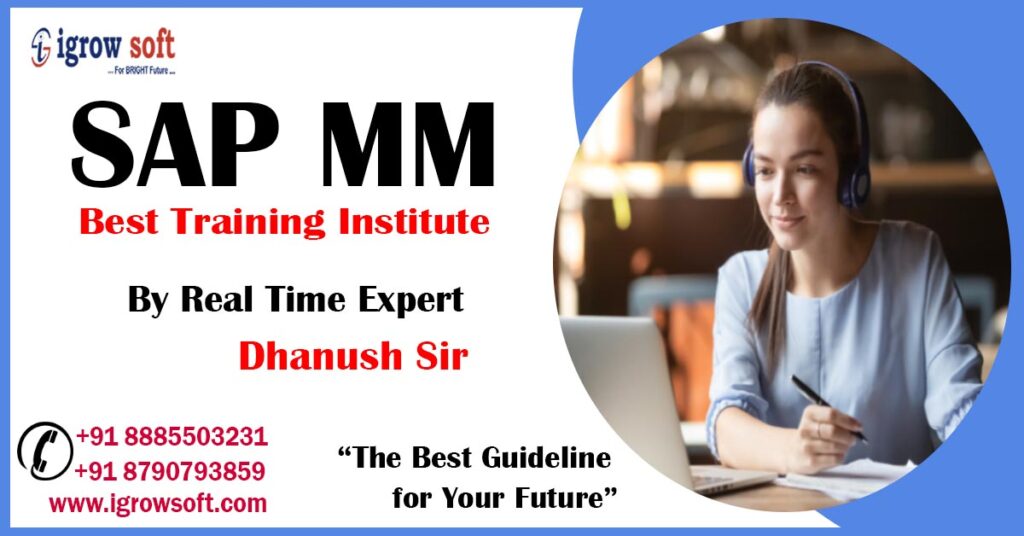
What is SAP MM :
SAP Materials Management is referred to as SAP MM. One of the main components of the SAP ERP (Enterprise Resource Planning) system, it’s made to handle different facets of an organization’s procurement and inventory management processes. The integration of inventory and procurement operations with other SAP modules, including Sales and Distribution (SD), Production Planning (PP), Finance and Controlling (FICO), and others, is crucial.
The primary capabilities of SAP MM include:
- Procurement Management: Organizations can efficiently manage the procurement process thanks to SAP MM. To do this, you must create purchase requests, send purchase orders to suppliers, get quotes, and process purchase orders. It streamlines supplier collaboration and automates the procurement workflow.
- Inventory Management: SAP MM assists in managing the entire lifecycle of the inventory’s materials. Handling goods receipts (from suppliers and production), issues (to customers and internal consumption), stock transfers, and physical inventory counts are all part of this process. It supports inventory optimisation and offers real-time visibility into inventory levels.
- Material Master Data Management: All material-related data is centralised by SAP MM in the Material Master data. This information is composed of various attributes, such as the description of the material, the unit of measurement, and valuation information. It guarantees that material data is accurate and consistent throughout the organisation.
- Vendor Master Data Management: SAP MM maintains comprehensive information about vendors in the Vendor Master data. This data includes vendor contact details, payment terms, delivery conditions, and other vendor-related information, allowing smooth vendor management and communication.
- Invoice Verification: SAP MM automates the process of verifying vendor invoices against purchase orders and goods receipts. It helps ensure accurate payment processing and reduces the risk of errors or discrepancies.
- Material Valuation and Price Control: To effectively manage material costs, SAP MM offers a variety of material valuation techniques (such as standard price and moving average price). The system values inventory items based on price control.
- Logistics Information Systems (LIS): The Logistics Information System, which offers extensive reporting and analytical capabilities, is integrated into SAP MM. It enables users to generate a number of reports on vendor, inventory, and procurement performance.
The SAP ERP system’s SAP MM module is a crucial component and closely integrates with other SAP modules to enable seamless data flow between various business processes. It is widely used to improve overall business operations, increase supply chain efficiency, and streamline procurement and inventory management tasks in a variety of global industries and organisations.
Best way to learn SAP MM:
Enrolling in a thorough training course that covers all the module’s crucial concepts and functionalities is the best way to learn SAP MM. Additionally, gaining practical experience through hands-on activities and actual scenarios will significantly improve your comprehension of and competence with SAP MM.
Advantages of Comprehensive training program:
- Structured Curriculum: Comprehensive SAP MM training programs are designed to cover essential topics systematically, ensuring a well-rounded understanding of the subject matter.
- Expert Guidance: Experienced SAP professionals who can share helpful insights, advice, and best practices typically lead training sessions.
- Hands-on Experience: In order to give students the opportunity to apply their knowledge in a real-world setting, many training programs provide hands-on exercises and practical projects.
- Certification Preparation: The SAP certification exams are covered in some in-depth training programs, and passing them can increase your marketability.
- Interactive Learning: Interactive sessions, group discussions, and Q&A opportunities are frequently included in training programs to enhance the learning process.
Keep in mind that comprehensive SAP MM training is only the beginning. Regular practice, involvement in real-world projects, and ongoing skill updating are requirements for SAP proficiency. Learning SAP is a journey, and your commitment to continuous improvement will help you reach your professional objectives.

